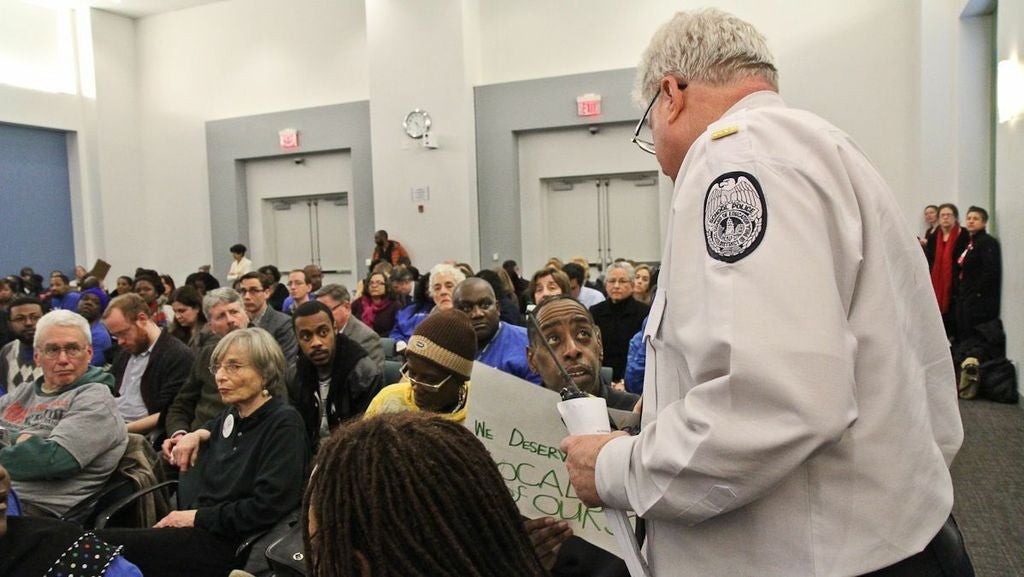Charter applicants turned down by Philly’s SRC get promises of help with appeals

Parents, teachers and charter school applicants crowd the room last week as Philadelphia's School Reform Commission voted on 30 proposals for new schools. (Kimberly Paynter/WHYY)
In the wake of the Philadelphia School Reform Commission’s decision to reject dozens of proposed charter schools, charter school advocates are preparing to help those applicants who were turned down make the most of their last chance.
Last week, the SRC voted down 34 of 39 applications for new charter schools. So far, at least two statewide organizations say they’re ready to help those charters navigate Pennsylvania’s appeal process, which could potentially overrule the SRC on any of the 34 rejections.
One such group is the Keystone Alliance for Public Charter Schools, run by Tim Eller who was the spokesman for the Pennsylvania Department of Education under former Gov. Tom Corbett.
“We’re hopeful that these schools do appeal. We do support charters in their appeal process,” Eller said. “That’s something that’s permitted under law. Let’s forget about the adults in the system, let’s forget about the districts themselves, let’s look at what’s in the best interests of students.”
Eller said the alliance has already reached out to all Philadelphia charters to inform them of their rights and other aspects of the appeal process. However, he downplayed the possibility that the alliance could support an individual school’s appeal by paying for legal fees or other expenses.
“I’m not saying definitely, but I don’t think that’s something the alliance could do,” Eller said.
Officials at a second state group, the pro-charter advocates PennCAN, say they too will be encouraging rejected charters to appeal, while offering some legal and strategic support to those that need it.
“PennCAN is encouraging all of the rejected high-quality applicants to pursue every possible option to gain approval, including resubmitting their application to the SRC and/or appealing to the Charter Appeals Board,” wrote PennCAN’s director, Jonathan Cetel, in an email.
PennCAN believes the SRC’s decisions on charters were “flawed,” Cetel wrote. Among his concerns: the fact that some charters, including KIPP and Mastery, submitted multiple applications that were “nearly identical,” and each was awarded only one school. Cetel believes that “despite public statements to the contrary, it’s obvious the SRC’s decisions were based on the district’s finances,” and he thinks that qualified charters stand a very good chance of winning appeals.
SRC chairman Bill Green has said that no school was rejected for financial reasons, but rather for academic shortcomings.
Like Eller, Cetel said that while his group is ready to lobby and network on charters’ behalf, PennCAN isn’t prepared to bankroll individual appeals from specific schools.
“The only judicial advocacy we have ever considered to this point is filing amicus briefs,” Cetel wrote. “Our role will simply be to offer strategic counsel as these charter schools make a very difficult decision about how to proceed.”
Not every group has made its plans known. At the region’s most prominent charter school advocate group, the Philadelphia School Partnership, officials have said they were “deeply disappointed” by the SRC’s decision to turn down the vast majority of charter applicants, and they would not rule out the possibility that PSP could eventually back some individual schools’ appeals.
For now, a PSP representative said it was too soon to say whether or how the group will involve itself in the the charter appeals process.
Philadelphia’s rejected charters have 60 days from the day of the SRC’s vote to appeal its decision.
Green has said he’s confident that the district can prevail against any school that appeals its decision.
This is a corrected article. A prior version misidentified Tim Eller’s job in the Corbett administration.
WHYY is your source for fact-based, in-depth journalism and information. As a nonprofit organization, we rely on financial support from readers like you. Please give today.

